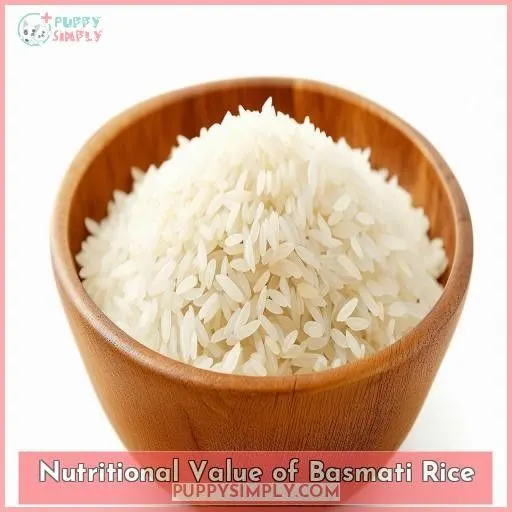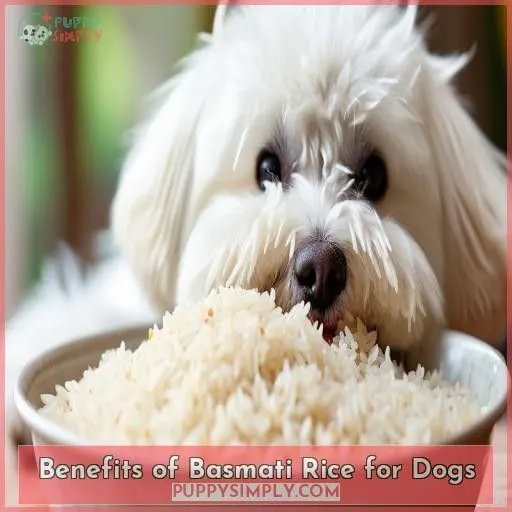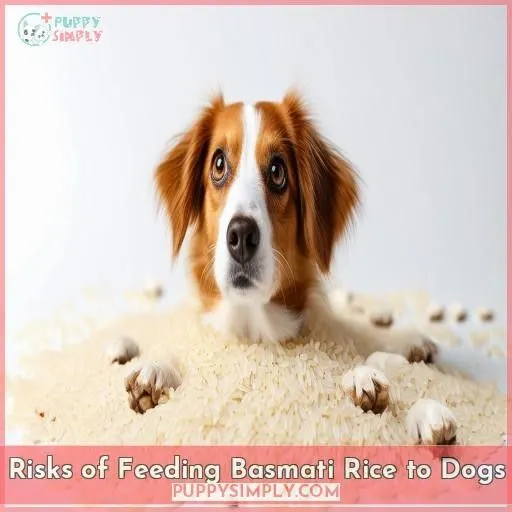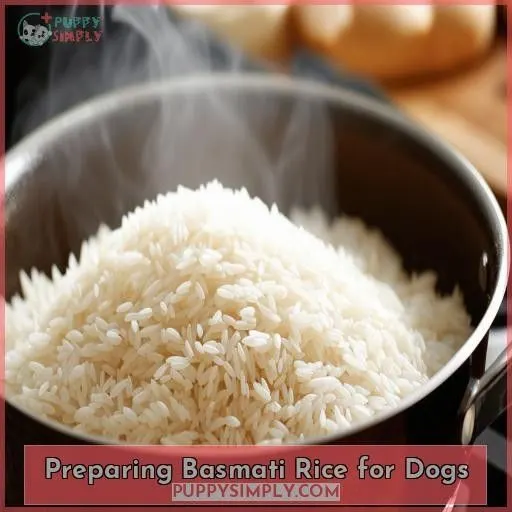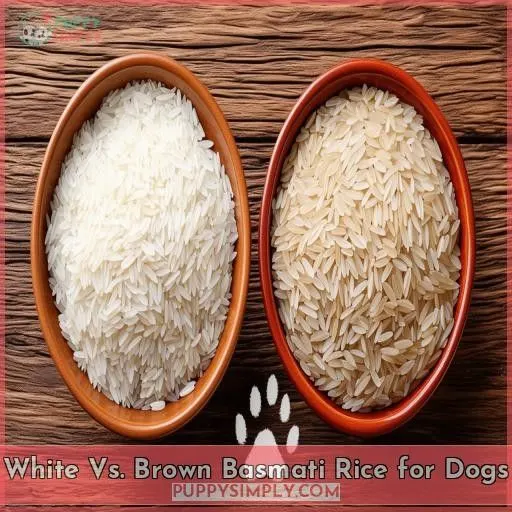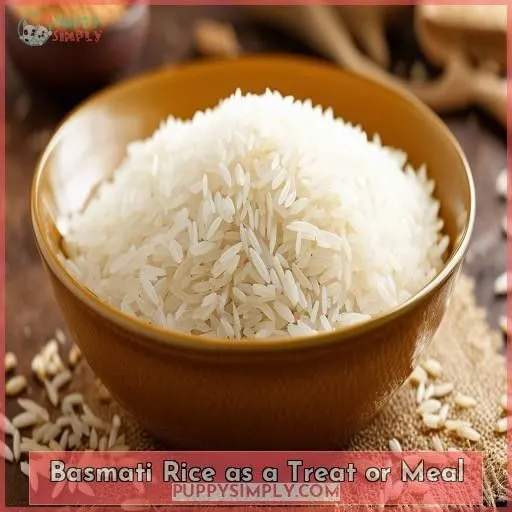This site is supported by our readers. We may earn a commission, at no cost to you, if you purchase through links.
 Absolutely, dogs can eat basmati rice in moderation.
Absolutely, dogs can eat basmati rice in moderation.
This aromatic, long-grain variety originates from India and Pakistan, offering a digestible energy source for your furry companion.
While lacking the nutritional punch of brown rice, basmati provides carbs, moderate protein, fiber, and essential vitamins and minerals.
It can aid in weight management, support healthy digestion, and regulate appetite when appropriately portioned.
However, be mindful of potential allergies, diabetes exacerbation, or gastrointestinal issues.
Cook basmati thoroughly without seasonings and introduce it gradually.
Explore deeper to learn preparation tips and the benefits versus risks.
Table Of Contents
- Key Takeaways
- Can Dogs Eat Basmati Rice?
- Nutritional Value of Basmati Rice
- Benefits of Basmati Rice for Dogs
- Risks of Feeding Basmati Rice to Dogs
- Preparing Basmati Rice for Dogs
- White Vs. Brown Basmati Rice for Dogs
- Basmati Rice as a Treat or Meal
- Basmati Rice for Puppies
- Other Rice Varieties for Dogs
- When to Consult a Veterinarian
- Frequently Asked Questions (FAQs)
- Can I give basmati rice to my dog?
- What kind of rice is good for dogs?
- Is basmati healthier than white rice?
- What rice can dogs not eat?
- How much basmati rice can be fed?
- Can basmati rice be cooked with broth?
- Is basmati rice safe for diabetic dogs?
- Can basmati rice be mixed with dog food?
- Are there any age restrictions for feeding basmati rice?
- Conclusion
Key Takeaways
- Basmati rice is a pawsome treat for your furry friend, offering a drool-worthy source of digestible carbs, protein, fiber, and essential nutrients. Just remember, moderation is key – we don’t want Fido packing on the pounds!
- When it comes to cooking up this aromatic delight for your pup, keep it simple and hold the seasoning. Plain, unseasoned basmati rice is the way to go to avoid any tummy troubles.
- If your dog is dealing with a sensitive stomach, diabetes, or other health issues, it’s best to give your vet a ring before adding basmati rice to their bowl. Better safe than sorry, right?
- Slow and steady wins the race when introducing any new food to your pup’s diet, including basmati rice. Start with small portions and keep an eye out for any signs of allergies or digestive upset. If all goes well, you can gradually increase the amount and watch your furry friend’s tail wag with delight!
Can Dogs Eat Basmati Rice?
Yes, dogs can eat basmati rice.
This long-grain, aromatic rice variety is safe for our furry friends to consume in moderation.
Basmati rice has a rich history, originating in the Indian subcontinent and Pakistan, where it has been a staple for centuries.
While it may lack the nutritional punch of brown rice, basmati still offers fiber and essential nutrients that can benefit your pup’s diet.
Just be sure to prepare it plainly without any added seasonings or oils.
As with any new food, introduce basmati rice gradually and keep an eye out for any digestive sensitivities.
Nutritional Value of Basmati Rice
You should understand the nutritional value of basmati rice to determine if it’s a suitable addition to your dog’s diet. Basmati rice contains carbohydrates for energy, some protein and fiber, and various vitamins and minerals in varying amounts depending on whether it’s white or brown.
Carbohydrates
Moving on to carbohydrates, basmati rice is a complex carb that provides steady energy for your pup. However, you’ll want to watch portion sizes, as too many carbs can lead to:
- Weight gain
- Spikes in blood sugar
- Digestive issues
- Potential food allergies
The glycemic index and fiber content vary between white and brown basmati, so consider your dog’s needs carefully.
Protein
Basmati rice contains a moderate amount of protein with a decent amino acid profile. This protein can contribute to your dog’s muscle development, coat and skin health, and sustained energy levels. However, due to basmati’s relatively low protein content and high glycemic index, it shouldn’t be relied upon as a primary protein source for your furry companion.
Fiber
Basmati rice is also a good source of fiber for your furry friend. Fiber aids digestion, regulating bowel movements and preventing constipation. It contains:
- Insoluble fiber from the grain’s outer bran layer
- Soluble fiber that helps maintain healthy gut bacteria
- Resistant starch, a type of carbohydrate that acts like fiber
This fiber content makes basmati rice gentler on your dog’s stomach, especially when dealing with gastro-intestinal issues or an upset stomach.
Vitamins and Minerals
Basmati rice is also a good source of vitamins and minerals for your pup. It contains B vitamins like thiamine and niacin, as well as minerals like iron and magnesium.
| Nutrient | Amount (per 100g) |
|---|---|
| Thiamine | 0.07mg |
| Niacin | 1.6mg |
| Iron | 0.7mg |
| Magnesium | 25mg |
These micronutrients are essential for your dog’s overall health and well-being, making basmati rice a nutritious addition to their diet in moderation.
Benefits of Basmati Rice for Dogs
Basmati rice can be a beneficial addition to your dog’s diet, providing a digestible source of energy and aiding in weight management. As a low-fat, low-calorie grain, it offers soluble fiber that supports healthy digestion and helps regulate your pup’s appetite and weight.
Digestive Health
Basmati rice is easy to digest, making it a great option if your pup is dealing with an upset stomach or other digestive issues. The fiber content can help regulate bowel movements, while the lack of irritating ingredients like spices and additives makes basmati rice gentle on sensitive tummies. Just be mindful of portion sizes to prevent weight gain.
Energy Source
Basmati rice can also serve as an excellent energy source for your furry friend. Its complex carbohydrates, fiber, and vitamins provide the fuel needed for daily activities and playtime. You’ll find your pup feeling energized after enjoying a serving of this nutritious grain. Just be mindful of appropriate portion sizes based on your dog’s size and energy needs.
Weight Management
Basmati rice can help with weight management for dogs. Its low-calorie content makes it ideal for overweight or obese dogs that need to shed some pounds. However, you’ll want to avoid overfeeding as too much rice can lead to obesity and its associated health risks like diabetes, pancreatitis, and malnutrition from an imbalanced diet.
Risks of Feeding Basmati Rice to Dogs
While basmati rice can be a healthy treat for dogs in moderation, it’s imperative to be aware of potential risks. Basmati rice may trigger allergic reactions, exacerbate diabetes, or cause gastrointestinal issues in some dogs, so consulting your veterinarian is advisable before introducing it to your pet’s diet.
Allergies
While basmati rice is generally safe for dogs, you’ll want to watch for potential allergies. Some dogs may have gluten intolerance or digestive sensitivities to rice. If your furry friend experiences vomiting, diarrhea, or skin irritation after eating basmati rice, discontinue feeding and consult your vet. Moderation is key for weight management and avoiding issues related to diabetes.
Diabetes
If your dog has diabetes, you’ll need to be cautious with basmati rice. Its high carb content can spike blood sugar levels, exacerbating insulin resistance. Monitor portion sizes and consult your vet. Brown basmati has a lower glycemic index and higher fiber content, making it a better option for diabetic dogs when fed judiciously.
Gastrointestinal Issues
You should also exercise caution if your dog has a sensitive stomach or gastrointestinal issues. Basmati rice may cause constipation, diarrhea, vomiting, or excessive gas in some dogs. If your pup experiences stomach upsets after eating basmati rice, consult your vet and avoid feeding it in the future.
Preparing Basmati Rice for Dogs
When preparing basmati rice for your dog, it’s vital to cook it thoroughly without any added seasonings, oils, or flavorings, as these can upset your pet’s digestive system. Start with a small portion of cooked, unseasoned basmati rice, and adjust the amount gradually based on your dog’s tolerance and dietary needs, as too much can lead to digestive issues.
Cooking Methods
You’ll want to cook basmati rice properly for your pup. The best methods are steaming or boiling, without any added seasonings, oils, or salt. This preserves the rice’s natural nutritional value while making it easily digestible for dogs. Be mindful of any potential allergies your furry friend may have when introducing new foods.
Portion Sizes
After cooking the basmati rice, it’s imperative to serve the appropriate portion sizes to your furry friend. As a general guideline:
- For small dogs, offer 1/4 cup of cooked rice per serving.
- For medium-sized pups, give 1/2 cup per serving.
- Large breeds can have up to 1 cup per serving.
- Puppies under 6 months should have smaller portions.
Monitor your dog’s digestive tolerance and adjust portions accordingly. Moderation is key when incorporating basmati rice into their diet.
Additives to Avoid
When cooking basmati rice for your pup, it’s essential to avoid adding any seasonings, salt, sugar, butter, or herbs. These additives can irritate your dog’s digestive system and even prove toxic.
| Additives to Avoid | Potential Risks |
|---|---|
| Salt | Sodium toxicity |
| Sugar | Weight gain, diabetes |
| Seasoning mixes | Irritants, allergens |
| Butter | Pancreatitis |
| Herbs | Gastrointestinal upset |
Plain, unseasoned basmati rice is the safest option for your furry friend.
White Vs. Brown Basmati Rice for Dogs
Regarding basmati rice for dogs, the selection between white and brown varieties is important. White basmati rice is easier to digest but lacks the nutritional content of brown basmati rice, which is higher in fiber, vitamins, and minerals, making it a healthier choice if your dog can tolerate it well.
Nutritional Differences
When comparing white and brown basmati rice for dogs, brown rice offers superior nutritional value. It’s richer in fiber, vitamins, and minerals due to retaining its nutrient-dense bran and germ layers. While white basmati provides carbohydrates for energy, brown basmati packs a more well-rounded nutritional punch for your pup’s overall health.
Digestibility
Regarding digestibility, brown basmati rice may be more challenging for your pup to break down compared to white basmati rice. This is because brown rice:
- Contains more fiber, which can be tougher on sensitive doggy tummies
- Has an intact outer bran layer that requires more effort to digest
- Offers more nutrient density, potentially causing digestive distress
However, proper cooking and introducing it gradually can help improve digestibility for furry friends.
Glycemic Index
While white basmati rice has a higher glycemic index, meaning it raises blood sugar levels more rapidly, brown basmati rice has a lower glycemic index due to its higher fiber content. This makes brown basmati rice a better option, especially for dogs with diabetes.
| Glycemic Index | White Basmati | Brown Basmati |
|---|---|---|
| Low (55 or less) | ||
| Medium (56-69) | ||
| High (70+) |
You’ll want to monitor your pup’s blood sugar levels closely if feeding white basmati rice.
Basmati Rice as a Treat or Meal
Regarding basmati rice, you can occasionally treat your dog with small portions. As a dietary addition, basmati rice can be included in your dog’s meals, but it shouldn’t substitute a complete and balanced dog food providing necessary nutrients.
Treat Guidelines
When giving your pup basmati rice as a treat, keep portions small to avoid gastrointestinal issues. A few tablespoons are plenty. Monitor for allergies or blood sugar spikes, especially if your dog has diabetes. Avoid additives like salt, butter, or spices – plain, cooked basmati rice is safest for occasional indulgences.
Meal Supplementation
While basmati rice can make a safe supplement to your dog’s meals, it shouldn’t be the main course. Mix in modest portions with your pup’s regular, balanced dog food to add variety without overdoing the carbs. Just be mindful of any potential allergies or health issues that may require adjusting rice intake.
Balanced Diet
While basmati rice is nutritious, it shouldn’t be your dog’s sole protein source. Make sure their diet includes other protein sources, fiber content, and vitamin supplements to prevent mineral deficiencies. A balanced diet with appropriate portions of basmati rice alongside high-quality dog food is ideal for your furry friend’s health.
Basmati Rice for Puppies
While basmati rice can be a healthy occasional treat for adult dogs, you should consult your veterinarian before introducing it to a puppy’s diet. Puppies have specific nutritional needs and delicate digestive systems, so it’s essential to follow your vet’s guidance when incorporating new foods.
Age Considerations
You should consider your dog’s age before introducing basmati rice. Puppies have delicate digestive systems, so proceed cautiously:
- Consult your vet first
- Introduce small amounts gradually
- Make certain proper nutrient intake
- Monitor for any adverse reactions
- Avoid rice until a few months old
Senior dogs may also need special dietary considerations. With a vet’s approval, basmati rice can provide essential nutrients and energy.
Introducing New Foods
When introducing basmati rice to your puppy, go slow. Puppies have sensitive stomachs, so start with small portions mixed into their regular food. Observe how they react before increasing the amount. Variety is key, so rotate basmati with their usual kibble. Consult your vet if digestive issues arise.
Puppy Dietary Needs
While basmati rice can be part of a balanced diet for adult dogs, puppies have unique nutritional needs during their rapid growth and developmental stages. It’s essential to consult your vet before introducing any new foods, like basmati rice, during the weaning process to guarantee you’re meeting your puppy’s specific dietary requirements for ideal growth and health.
Other Rice Varieties for Dogs
While basmati rice offers a nutritious option for dogs, other varieties like white and brown rice can also be incorporated into their diet. Each type has its own benefits and considerations – white rice is easy to digest but lower in nutrients, while brown rice is more nutrient-dense but may cause digestive issues for some dogs.
White Rice
You can feed your pup white rice as a supplement to their diet. While lower in nutrients than brown rice, it offers:
- Excellent digestibility for sensitive stomachs
- A source of energy from easily-metabolized carbs
- Aid in weight management when portioned properly
White rice is a gentle, palatable option for dogs, especially when recovering from an upset stomach.
Brown Rice
Brown rice is a nutrient-dense option for dogs. While lower in calories than white rice, it boasts:
| Nutrient | Value |
|---|---|
| Fiber | High |
| Protein | Moderate |
| Vitamins/Minerals | Moderate |
Its high fiber aids digestion, and lower glycemic index benefits diabetic pups. Some find brown rice harder to digest, so monitor your dog’s tolerance.
Wild Rice
Want to diversify your pup’s diet with wild rice? This nutrient-dense grain offers:
- High fiber content
- Essential minerals like manganese
- Antioxidants like anthocyanins
Wild rice is an affordable, readily available option. However, note potential ethical and environmental concerns with its harvesting methods. As always, moderation is key for your furry friend.
When to Consult a Veterinarian
It’s wise to consult your veterinarian before introducing basmati rice or any new food to your dog’s diet, especially if your furry friend has specific dietary needs or health conditions like diabetes or gastrointestinal issues. If you notice any adverse reactions after feeding your pup basmati rice, such as vomiting, diarrhea, or allergic symptoms, seek prompt veterinary advice.
Dietary Concerns
You’ll want to consult your vet before feeding basmati rice to your pup if they’ve dietary concerns like allergies, diabetes, or gastrointestinal issues. For puppies, check with your vet about introducing new foods and ensuring their dietary needs are met. And when comparing white and brown basmati rice, the brown variety is generally more nutritious.
Health Conditions
You should also consult your vet about feeding basmati rice if your dog has any health conditions that could be impacted by its diet. Some examples include:
- Diabetes or blood sugar issues
- Grain intolerances or food sensitivities
- Vitamin deficiencies that need dietary management
Your vet can guide you on whether basmati rice is compatible with your dog’s prescribed diet plan. Their expertise will help keep your furry friend healthy and happy.
Allergic Reactions
You should always monitor your dog for allergic reactions after introducing new foods like basmati rice. Watch for skin irritations, vomiting, or diarrhea. If severe reactions occur, like difficulty breathing or anaphylaxis, seek immediate veterinary care. Mild reactions may resolve by removing the allergen from their diet. Consult your vet with any concerns.
Frequently Asked Questions (FAQs)
Can I give basmati rice to my dog?
Yes, you can serve that exotic grain to your furry friend! Basmati rice is perfectly safe for dogs when cooked simply without any seasonings or added flavors.
What kind of rice is good for dogs?
For dogs, brown rice is the healthiest option as it’s nutrient-dense and high in fiber. White rice can aid upset stomachs, but moderation is key. Consult your vet before introducing new foods to ascertain your pup’s diet is balanced and appropriate.
Is basmati healthier than white rice?
Basmati rice, like its white cousin, offers lean energy for your pup. However, brown basmati packs a nutritious punch with more fiber and vitamins – a wholesome way to vary Fido’s diet.
What rice can dogs not eat?
You’ll want to avoid yellow, flavored, or spiced rice as the additives can upset your pup’s stomach. Stick to plain white or brown rice without any seasonings for a safe treat.
How much basmati rice can be fed?
You can give your dog a small portion of cooked, unseasoned basmati rice – around 10% of their daily calorie intake as a treat. Monitor their digestive response and consult your vet if concerned.
Can basmati rice be cooked with broth?
When cooking basmati rice for your furry friend, using a delicious, low-sodium broth instead of plain water can make mealtime extra special. Just be sure the broth doesn’t contain any harmful ingredients.
Is basmati rice safe for diabetic dogs?
Before feeding your diabetic dog basmati rice, consult your vet. They’ll consider your dog’s specific needs and recommend a diet that keeps blood sugar stable. Basmati rice may be okay in moderation with vet approval.
Can basmati rice be mixed with dog food?
Why not make your pup’s kibble a gourmet affair? Mix in some cooked basmati rice for a balanced meal that’ll have their tail wagging. Just keep the portion small to avoid digestive upsets.
Are there any age restrictions for feeding basmati rice?
Before feeding your pup basmati rice, consult your vet – especially for puppies. Their delicate stomachs may not tolerate new foods well. Introduce rice gradually and watch for any adverse reactions, just to be safe.
Conclusion
Can dogs eat basmati rice? Absolutely, but in moderation.
Basmati rice offers digestible carbs, protein, fiber, and essential nutrients for your furry friend. It can support digestion, energy levels, and weight management when cooked plain and portioned appropriately.
However, be mindful of potential allergies, diabetes, or gastrointestinal issues. Introduce basmati rice gradually and consult your vet if concerns arise.
With proper preparation and portion control, basmati rice can be a tasty, nutritious addition to your dog’s diet.

